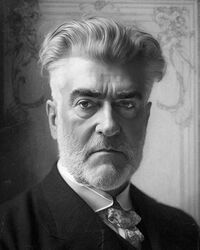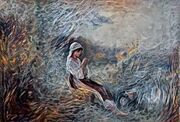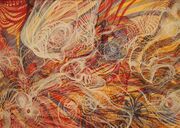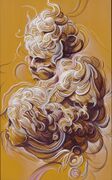Beranism
This article is incomplete because it is pending further input from participants, or it is a work-in-progress by one author. Please comment on this article's talk page to share your input, comments and questions. Note: To contribute to this article, you may need to seek help from the author(s) of this page. |
Beranism is an ontologically monistic moral philosophy which serves as the de facto state philosophy of the Prime Republic of Ostrozava. It originates from the works of early 20th-century Ostrozavan philosophers Vlastimil Beran and Julius Jahoda. Existing in relation to ideas derived from Wernerism, Beranism instead focuses on metaphysical issues such as free will, the nature of the Absolute, and the meaning of life, asserting idealistically that Wernerist materialism was incompatible with psychological discoveries about psychological needs and that to address class struggle is to use idealism and materialism in equal amounts. In writing, Beran referred to his work as aiming to find "global consensus on conceptions of class neeeds"; Beran and Jahoda both did not frame their philosophies as a formulation, but rather as a discovery of existing natural systems.
Origins
The set of beliefs that would later come to be codified as Beranism came about in the late 1890s to early 1900s, after members of the Wernerist Transkarminian academic underground went on a "journey of discovery" across the world. Their initial goal was to develop ways to apply communalist methods of governance seen worldwide as an alternative to the pseudo-kleptocratic monarchy then in place in Transkarminia. Ostrozava and the broader Transkarminian region had long been cohabitated by the followers of diverse religious beliefs, primarily Nazarist in character for the previous several centuries; there had nevertheless also been massive influences from both the Fabrian and Lutheran Churches, Judaism, and both Ludic and Magnish Paganism.
Beranism was the result of syncretic and vigorous scientific and parapsychological examination of world religion and spirituality. Aiming to "mend the broken sense of meaning" caused by the dawn of Karminianism, Beran in particular rejected the materialist views of contemporary socialist and populist philosophers, insisting that phenomena such as intuition and consciousness disavowed said claims. For Jahoda, the focal point of interest became the native religions of Norumbia, particularly the belief in the Great Mystery varyingly espoused by Wabayan, Quanitigan, Kahnawà꞉ke, and Okomi peoples living throughout the plains of northern Norumbia, since, according to Beran, these religions had much in common with other religions' early forms. Beran, on the other hand, had become fascinated with the principles of the various enlightenment-based faiths of the Ozeros and Ochran, such as the Enyamo-Tsurushimese Furozin, Pulaui N'nhivara and the Dharmacakra faith of Ayvana and Shambahala. Beran is widely considered to be one of the pioneers in the fields of comparative mythology and comparative religion, with his seminal work, The Universal Rhythm, continuing to influence philosophers and storytellers today. Upon returning to Karsko, various activists which had taken their own individual journeys abroad coalesed in the Three Forks Tavern (Ostrozavan: Hospoda Třividlice), where several intense philosophical discussions took place, attempting to outline commonalities observed between the individual members' observations about global religion, and the infant but revolutionary academic fields of psychology and quantum theory, specifically the observer effect, which Beran viewed as disproof of pure materialism that suggested the existence of what he deemed 'pure consciousness'.
Fascinated by the discussions, Beran and Jahoda saw that the other members of the Drinking Club, such as Vladan Vítek, had taken a more immediate interest in the emancipatory struggle, by 1900 already attempting to organize the 1st Worker's Convention, in the nascent beginnings of the Crimson Revolution. Seeing the infant movements beginning to take steam, but taking note that the vast majority of the Ostrozavan people had "split between fanaticism or cynical indifference", Beran and Jahoda began writing O Původu Boha (Ang: On the Origin of God), widely considered to be the central text of what became Beranism.
Beranism has had a profound impact on global academia, having influenced many fields, including archaeology, art history and theory, anthropology, media studies, science studies, political science, theater, history, sociology, cultural studies, education, economics, ethics, criminology, geography, literary criticism, film theory, psychology, and philosophy.



